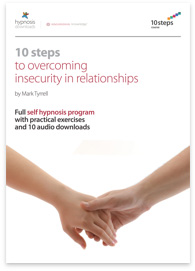Put the Spark, Fun and Excitement back into Your Relationship
7 tips to spice up life with your partner

"Relationships, like fires, need to be kept burning, else they'll go out!"
Terminal boredom - the dry rot of relationships
I love people-watching. Yes, I know everyone says that, but I really do - and perhaps now and then with a somewhat professional eye.
There they sat, both about fifty. I guessed they'd been together since Paleotimes, but even so, I was struck by the sheer boredom emanating from each of them toward one another. They didn't speak; not an angry silence, but a "What possibly else can there ever be to talk about? We've said it all." Maybe I'd caught them on an off day, but I'd seen them having lunch in this pub before and it was always the same.
But had it always been like this? When had they become just a habit to each other, a piece of unloved furniture, barely noticed? The man caught me studying his wife and gave me a "you're welcome to her, pal" look - the green-eyed monster jealousy had obviously fallen into a deep prolonged snooze. They didn't hate each other; in a way, it was worse. They'd become indifferent.
Can the embers of a dead relationship be re-lit? Can we recapture the horse once it's bolted? Re-energize the... oh, okay, enough. Let's see what we can do:
1) Prioritize your relationship
Relationships need to be maintained; they don't just look after themselves. A couple whose relationship has grown stale may put the dirty dishes, feeding the cat, doing Pilates, and finishing the crossword puzzle before spending time with their partner.
In one study it was found (not at all surprisingly) that the happiest couples spent the most leisure time together. The research looked at 250 couples and found that, in particular, wives who spent the least leisure time with their husbands were the unhappiest (1).
Look after your relationship by aiming to have an uninterrupted time together every day and making that an important part of your day. Organize stuff that you both like to do ahead of time. This can feel strange at first if you've just been rubbing along for decades, but consider it a form of dating.
2) Listen to your partner
Attention is a gift and an exchange of attention forges closeness. Ask your partner about what they have been doing and listen to what they tell you. So often a couple will talk but not listen, as in:
Him: "I went to the garage today to see about the car."
Her: "That woman Kathy at work is driving me nuts at the moment!"
Him: "I think it's going to need a new gasket! That could be expensive!"
Her: "She's always criticizing my work..."
Listen and feed back what your partner tells you. Encourage their dreams, as there's nothing worse than someone being dismissive of your interests or plans. But what if the very way you see your partner is all skewed?
3) Remove negative filters
Once we feel that "whatever we do is wrong" and we "can't win", then we may stop bothering. How we 'filter' the actions of our partner is so important. If we see even good actions as "one good deed from an otherwise bad person", then we'll feel negatively about them even when they make efforts. For example, one man surprised his wife by buying wonderful food and taking her on a picnic somewhere beautiful. She later said to him (in front of me): "That's the only nice thing you've ever done in seventeen years of marriage!" Now, that wasn't true, but she had become so used to perceiving him and his actions negatively that she just couldn't help herself.
If you and your partner have started seeing each other through a 'negative filter', then the next tip will be extra useful:
4) Give good compliments
Compliments are powerful; use them. So many couples come to feel that it is their role in life to point out what is 'wrong' with their partner and assume that 'what is right with them' is understood and doesn't need saying. This is a big mistake! Find things to compliment your partner about regularly. But how you compliment is vital.
Don't just give empty compliments such as: "You are wonderful!" This may be nice to hear, but it's not specific. People know they are not wonderful in all ways. We are more likely to feel a compliment is sincere if it's linked to an event or time. For example:
"That was great the way you handled that rude man in the bank. You were so calm and you stood your ground!" or "I'd forgotten what a fantastic dancer you are! The way you danced tonight was amazing!"
Your partner needs to be able to relate to the compliment.
5) Couples who laugh together last together
My couple in the pub looked as if a smile, let alone a laugh, might inflict irreversible facial damage. They looked like they were presiding over an autopsy under the gaze of relatives of the deceased. Couples need to laugh together - sometimes.
Many couples have great memories of having really funny times together. But what happens to those memories? They just get left in the back closet of the mind, gathering dust. But research tells us that couples who regularly reminisce about funny times develop stronger relationships.
Psychologist Doris G. Bazzini at Appalachian State University found that couples who laugh together and intentionally reminisce about that shared funny experience are likely more satisfied with their relationship than those that don't (2).
Her team studied 52 couples and found that couples who recalled times they had laughed together immediately reported an increased satisfaction in their relationship.
6) Remember when...?
But you can go further. How did you meet? How were you together during the initial excitement of getting to know one another? I asked one couple who'd grown stale with one another to tell me about the time they had first met. The woman's face suddenly brightened and he smiled.
"We were in a bar, and...it sounds corny, but our eyes met across the crowded space and it was like the parting of the Red Sea. It was just me and him - it was amazing."
They went on to talk about their early good times and I could tell they were feeling better about each other than they had in years.
Revivify early parts of your relationship; remember how you laughed together, how much fun you had, how excited you felt when you used to see each other.
7) Reintroduce intimacy
If lovemaking and physical affection have become scarcer than an untouched rainforest, suddenly jumping back into bed with one another after possibly years of no sex can feel daunting and unrealistic.
Instead, begin to restore intimacy gradually. Take time to kiss your partner in the morning and when you see them again. Make your kiss a little more lingering sometimes, hold your partner's hand and touch (not necessarily in a sexual way) now and then. In this way, when you do start to make love again, it will feel like a natural progression from day-to-day affection and intimacy.
I think people are all too prepared sometimes to throw away perfectly good relationships just because they have been led to believe they "shouldn't have to" make efforts.
As for that couple in the pub, I haven't seen them in a while. Maybe he's had an affair with a lithesome trapeze artist and she's run off with her swarthy Latin dance teacher... no, I don't think so.
10 Steps to Overcome Insecurity in Relationships course
Despite how much you love your partner, are you worried you're driving them away?...
References
- See John Gottman's book, How Marriages Succeed or Fail.
- Bazzini's study, which appeared in the January 2007 issue of the journal Motivation and Emotion, quotes her as saying: "There are several benefits from reminiscing about laughter. First, it induces laughter, and laughter has a positive affective component, because laughter has been shown to lower blood pressure, and it triggers the release of endorphins, which results in a sense of well-being. But you also reap this cognitive benefit which colors your judgment of the relationship and validates the self at the same time. I doubt that couples realize why it's so reinforcing. It says this is something special between us and creates a bond and cohesiveness in the relationship."







